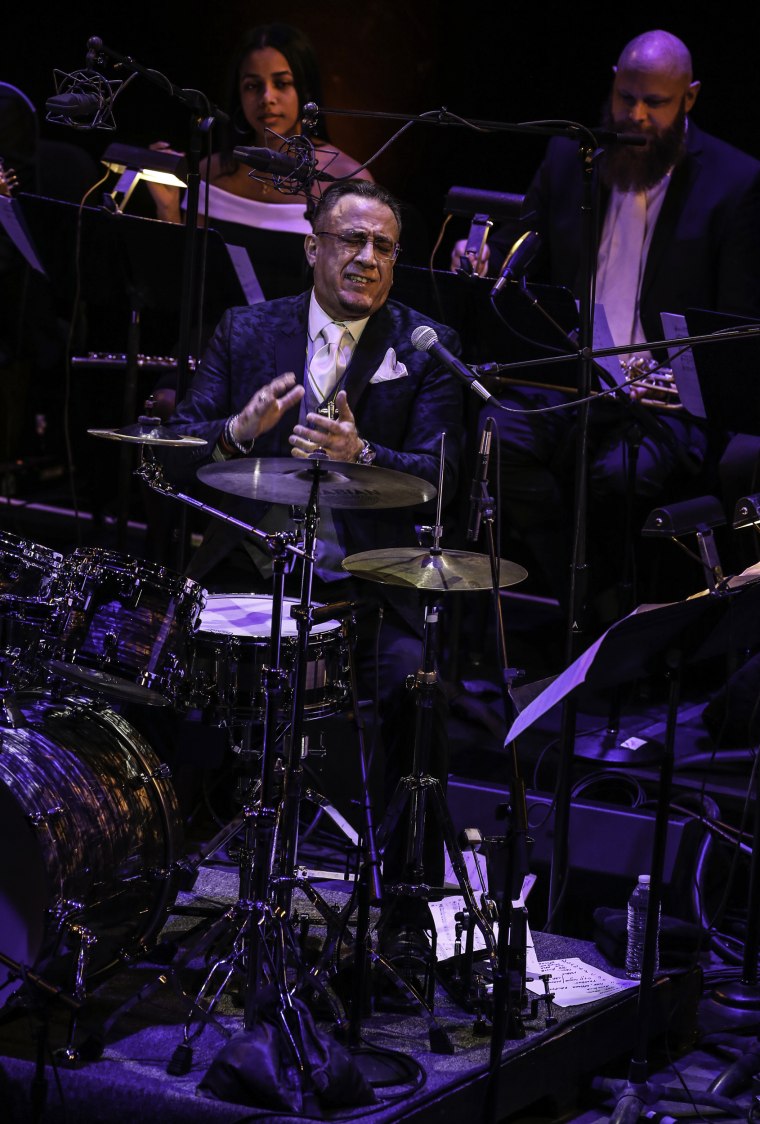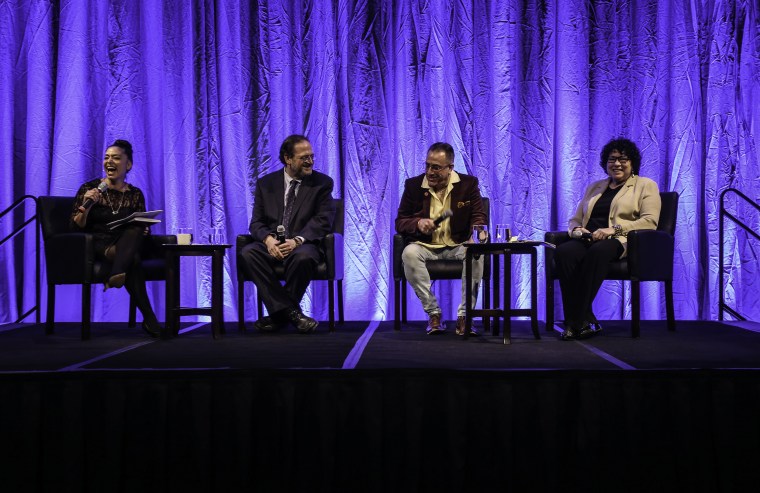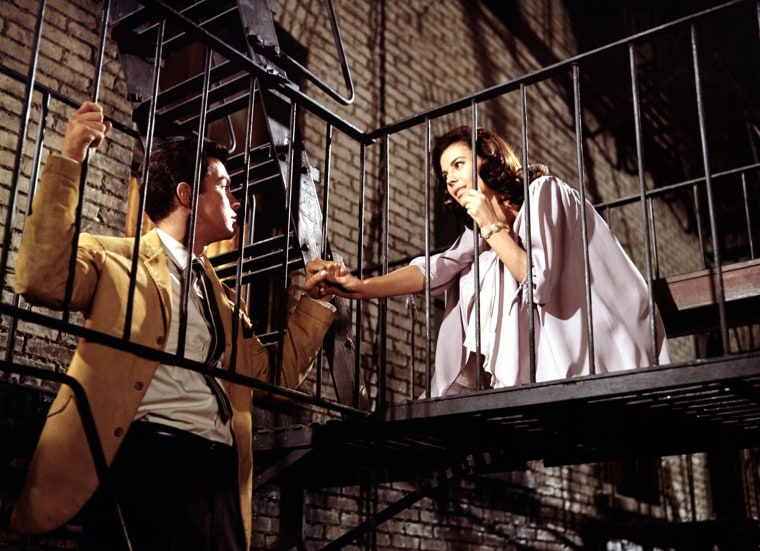WASHINGTON — Can a beloved American musical and movie get an update — without the outdated stereotypes?
Filming is expected to start this summer on the remake of the 1961 smash hit movie "West Side Story," based on the 1957 musical. The film garnered 10 Oscars — a record that still stands as the most for a movie musical.Acclaimed director Steven Spielberg and award-winning screenwriter Tony Kushner are spearheading the much-publicized new version.
With its memorable songs and choreography, "West Side Story" became an instant classic when it came out on screen, with its retelling of the "Romeo and Juliet" story through the doomed love affair between a Puerto Rican young woman — played by Natalie Wood — and an Polish-American young man amid rival gangs in 1950s New York City.
But it's evident that the 1961 film — with a largely non-Latino cast wearing dark makeup and speaking with an accent to seem more Hispanic — is a throwback to casting and stereotypes that wouldn't pass muster today.
“The discussions we’re having (these days) about representation and brown face and blackface and how actors should be playing people of color, I think are very relevant," Frances Solá-Santiago, an arts and culture writer in New York City, said. "I saw it again a month ago and it was cringeworthy at times. Hopefully, it will do justice to what the first movie lacked in its storytelling.”
Still, the original film resonated with Latinos who identified with the cultural divisions the movie showed.

“I saw myself in West Side Story. I experienced that kind of racial profiling they portray in the film,” composer and drummer Bobby Sanabria, 61, told NBC News. The musician, whose recent Grammy-nominated "West Side Story Reimagined" takes the entire original score in a Latin jazz direction, said the movie was one of the first times he saw his experience as a Puerto Rican growing up in the New York City borough of the Bronx reflected on the screen.
Six decades later, he thinks it remains an important story.
“Ignorance is what prevails in the United States and West Side Story challenges that," Sanabria said. "It asks the question of how do you deal with hate and bigotry. That’s very relevant today.”
Sanabria, along with Supreme Court Justice Sonia Sotomayor — another native New Yorker of Puerto Rican descent — participated in a forum in January at the Kennedy Center for the Arts in Washington, D.C., where they discussed the original film and the upcoming remake.
Sotomayor captured why so many viewers — including Latinos — fell in love with the movie so many decades ago.
Sotomayor said she was “captivated” by the music, in particular the song “I Feel Pretty.”
“What 13-year-old girl doesn’t listen to that song and secretly in her room twirl around? It was a movie with so much impact, even at 13," she said.
She described the musical's most enduring and popular song, "Maria," as what "a love song should be."
In fact, one of the song's most iconic stanzas was the backdrop of Lin-Manuel Miranda's hit, "Almost Like Praying," which he recorded with other high-profile musicians in October of 2017 to raise money for Puerto Rico after it was destroyed by Hurricane Maria.
"There are few plays with as many songs that have entered the consciousness of the world," Sotomayor said at the Kennedy Center discussion. "I don’t think it’s just Americans who know those songs. It’s probably people around the world.”
How can Spielberg make it better?
Solá-Santiago said that despite her qualms about the original movie, her favorite part was seeing Rita Moreno in the film playing Anita, Maria's friend and the girlfriend of Maria's brother, Bernardo. “She was very genuine in her portrayal,” Solá-Santiago said.
The only Latina in the 1961 movie, Moreno ended up winning an Oscar for her performance — the first Latina and first Puerto Rican woman to do so. In the new version, Moreno is back but in a completely different role — she will now play Doc, the shopkeeper, who was a man in the original movie.
More importantly, as opposed to the original movie, the new version will have a largely Latino cast.
Rachel Zegler, 17, a Colombian American, will play Maria opposite Ansel Elgort as Tony. Broadway veteran Ariana DeBose has been cast as Anita, David Alvarez will be Bernardo and Josh Andrés Rivera was cast as Chino.
That has the potential to be a great showcase for Latino talent, according to Félix Sánchez, chairman and co-founder of the Washington-based National Hispanic Foundation for the Arts.
“What I’m excited to see is the next generation of new Latino actors who come together to tell a story of unrequited love. It’s a beautiful tribute to the arc that was started in the first West Side Story," Sanchez told NBC News. "It gives us so much to talk about, such as how to deal with bullying, how to deal with peer pressure, how to deal with gang relationships, how to deal with conflicts within the family.”
To avoid a film that doesn't capture the nuances of Puerto Rican culture without the stereotypes, the producers of the new version traveled to Puerto Rico several months ago to meet with members of the artistic and cultural communities on the island.
“One of the reasons we’re here, one of the reasons we’ve hired so many Puerto Rican singers and dancers and actors is so they can help guide us to represent Puerto Rico in a way that will make all of you and all of us proud,” Spielberg told an audience at the University of Puerto Rico in December. “It’s very important to us that everything be absolutely authentic, including props, signage, the language, the customs, and the slang and colloquialisms of the time.”
Sanchez said that should make a difference.
“They’re (Spielberg and Kushner) not starting out with assumptions,” Sánchez said. “I think they’re making more than a goodwill effort to receive cultural information that will make the film relevant and authentic to the audience. Of course, the proof is in the pudding, but I think they’re taking the right approach."
Mario Roche, a professor at the University of Puerto Rico's School of Communications, said the new film is coming out during a critical time for U.S. Latinos.
"It will be real interesting to see how this film is received during the Trump era which has seen a tremendous polarization and discrimination against those communities that are not seen as majority white," he said. "We’ll have to wait and see if any of the meetings in Puerto Rico played a role in what ends up in the film.”
Spielberg himself alluded to present-day politics playing a part in the movie, telling the island's university audience that while it is — as the original Broadway play and movie were — a retelling of Romeo and Juliet, it speaks a lot to what is happening at the border "and the rejection of anyone who isn’t white, and that’s a big part of our story.”
At the Kennedy Center discussion, Sotomayor said that as she's become older, she can see the political and social implications of the film.
“I think in some ways it was ahead of its time. As I rewatch it now, I realize this is pretty upfront stuff and very complicated for 1960,” Sotomayor said. The question now is how to advance the issues for a new audience without losing the film's hold on audiences, she added.

"To be creative, you have to take something that was ahead of its time then and bring it ahead of its time now, and that doesn’t mean duplicating it but expanding it and making it richer in some ways,” Sotomayor said.
Though there is anticipation — even trepidation — around the new film, a remake of a classic that resonated with so many people about a community that has long been part of the country's Latino fabric has grabbed the attention of many.
“It’s coming from a cultural perspective that we hadn’t seen before," Sanchez said."We’re at a place now where it’s long overdue.”
FOLLOW NBC LATINO ON FACEBOOK, TWITTER AND INSTAGRAM.

